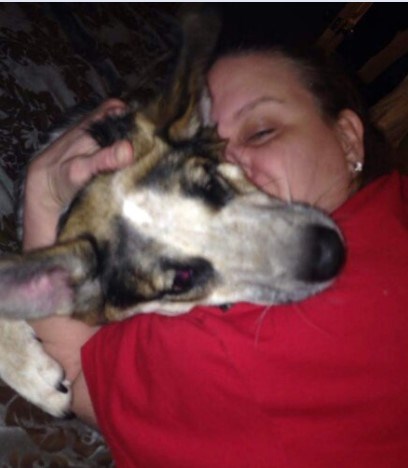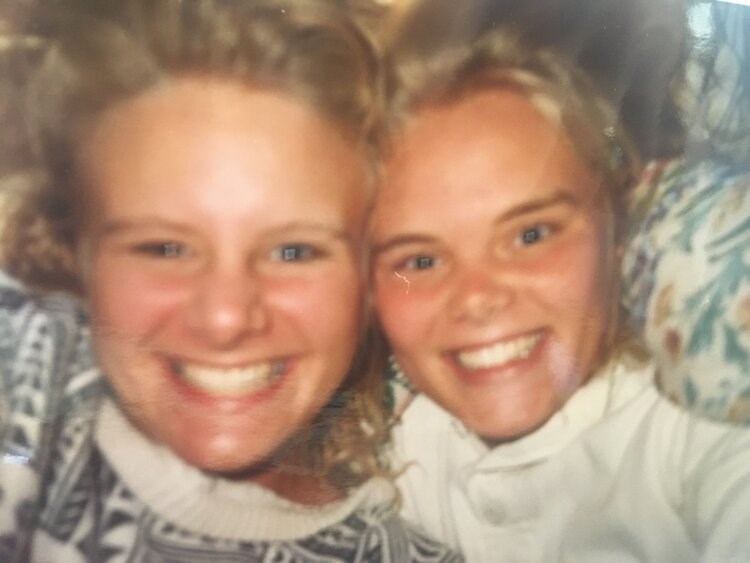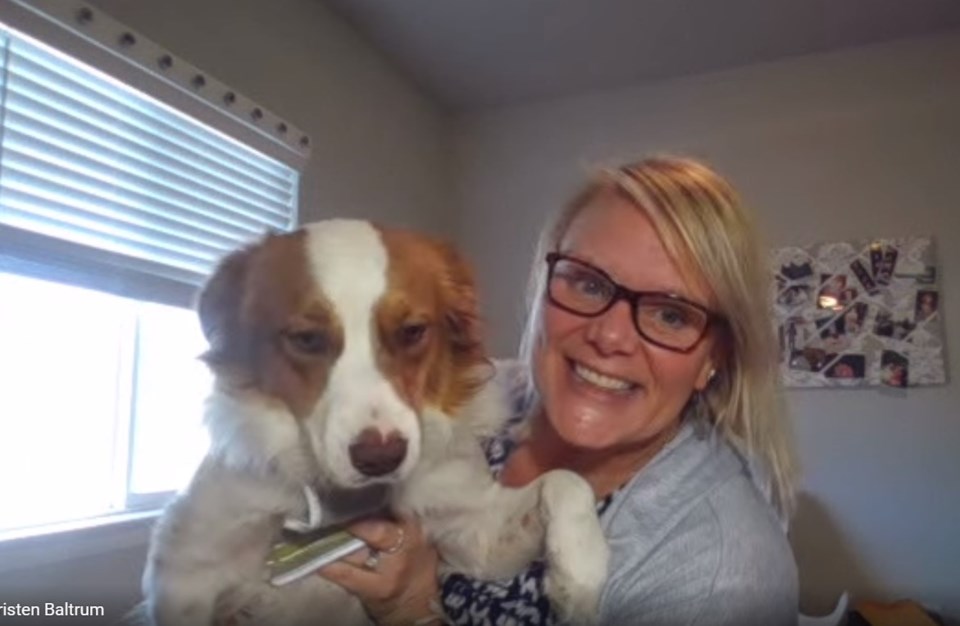A new nonprofit organization created by a local woman in response to a personal tragedy has set up shop in Longmont.
Annie & Millie’s Place — dedicated to providing services to people experiencing homelessness and their pets — is a labor of love for Kristen Baltrum.
Baltrum’s sister and half of her nonprofit’s namesake, Annie, died by suicide in July 2019 while she was homeless. Millie was Annie’s dog, with her to the end.
Before Annie’s death just before her 51st birthday, Baltrum said she questioned why her sister didn’t surrender her dog to a humane society so she could get the services she needed, or at the very least, sleep at a shelter instead of outdoors or anywhere else she could find. Baltrum said she and her family members also had to make the hard choice about “not continuing to enable” Annie after they had put her up in hotel rooms and prepaid restaurants for meals. As they stood firm, Baltrum would see Facebook posts from Annie sharing acts of kindness from strangers on her behalf, such as money for a meal.
“That was the beginning of my transformation,” Baltrum said. “This random stranger was doing something I could no longer do. … That’s the moment I started to believe I needed to be someone else’s ‘stranger.’”
 Annie and Millie, the namesakes of Kristen Baltrum's new nonprofit, Annie & Millie's Place. Courtesy photo
Annie and Millie, the namesakes of Kristen Baltrum's new nonprofit, Annie & Millie's Place. Courtesy photo“In retrospect, we know Annie probably fought longer and lived longer because she had a sense of purpose in taking care of her animal,” Baltrum said. “At the same time, Millie gave her the love and compassion that even Annie’s family, our family, had to stop providing.”
Baltrum said she believes the human-animal bond between Annie and Mille was life-sustaining for Annie.
Dr. Jon Geller, veterinarian and founder of The Streedog Coalition, said pets can be a barrier to suicide. Pets, he said, “provide purpose in otherwise purposeless lives.”
Leslie Irvine, a Longmont resident and University of Colorado Boulder sociology professor who did interviews with 75 homeless individuals for her 2013 book “My Dog Always Eats First: Homeless People and Their Animals, said “pets are certainly important in homeless people’s lives, just as they are important in our lives. Pets, she said, provide structure, whether their owners have roofs over their heads or not. From waking in the morning to walks to feedings, animals create routines for their owners, Irvine said.
They also provide a sense of self-worth, she said. Often very few people, if any, care about individuals experiencing homelessness and having a pet, “another being that cares for you, that thinks you are the greatest thing on earth, is so essential for your sense of who you are,” Irvine said.
Pets also often can be catalysts for life-changing choices, she said. A chapter in her book, “Lifechangers and Lifesavers,” includes specific cases of how “people had to actively choose between using drugs, being a street prostitute, continuing to go to jail or taking care of their animals,” she said.
Geller said he was inspired to start the nonprofit Streetdog Coalition after a non-verbal interaction with a homeless man and his friendly pit bull on a bridge in Nashville. Seeing the man and his dog made Geller realize with no money the man wouldn’t be able to pay for veterinary care, not even a discounted vaccine.
The nonprofit since 2015 has grown to have a presence in 50 cities and pre-COVID also conducted clinics in the parking lot at the OUR Center in Longmont. It also is exploring how it might work with Annie & Millie’s Place to offer more services locally.
In the course of serving the homeless and their pets over the past five-plus years, Geller said he has learned much, and like Beltram has found that homeless pet owners often turn the stigma about poor quality of life for animals on its head.
“Most of these pets have better lives than most of our pets. They’re with their master 24/7, living an outside and active life. They’re busy and their owners put their priorities first. It’s true that they will make sure that pet is taken care of,” he said, adding organizations such as his and Baltrum’s can help fill in the gaps such as food or vet care.
He and Irvine, who calls Geller a hero for the work The Streedog Coalition does, both advocate for the “One Health” approach that recognizes that human health, animal health and environmental health are linked. They envision, as does Baltrum, a way in which medical and mental health services for owners can be part of clinics for pets. For example, with medical staff on hand, a pet can see a veterinarian and a pet owner can get treatment for an infected cut or a referral for other services, Irvine said. Such an approach is in use across the country, as well as at Streedog Coalition clinics.
More importantly, they all advocate for recognizing how important pets are to those experiencing homelessness.
“This is Annie’s story, but the biggest thing is to change minds,” Baltrum said.
Renee Ikemire, manager of HOPE for Longmont’s SafeLot program, said half of the people interested in the program are interested because they have pets. The SafeLot program, the first of its kind in Colorado, according to HOPE, provides a place for people living in their cars to safely park overnight and access showers and storage and share evening and morning meals.
“When you have a pet, that’s the only thing you have, especially when you’re homeless,” she said. “I honestly think they’re like their kids. Every client that comes through SafeLot refers to pets as their kids. They’re just as important as human family members would be.”
Irvine said it would be hard to imagine someone being asked to surrender their kids to receive help, and Ikemire said many people don’t stay at shelters because they cannot bring their pets with them.
Homeless pet owners also struggle with what to do with their animals when they work or seek employment, go to appointments or deal with other day-to-day activities, Irvine said.
That’s where Baltrum said she hopes Annie & Millie’s Place also can make a difference.
“We’d love to have a free doggie day care for folks who need someone to trust to watch their animal,” she said.
Beyond that, some of the ideas she’s kicking around for her new nonprofit include partnering with The Streetdog Coalition and providers such as HOPE to bring services to both homeless people and their pets, creating backpacks full of supplies for people and animals or maybe even creating a “bed and breakfast” for people and animals where individuals experiencing homelessness “can take a break.”
Before she died, Annie did just that for a couple living in their car, Baltrum said.
“I would love to do what she intended to do,” she said. “She ended up in the same position they were in, but her heart was all about providing for those in need. That heart in our logo is really her heart.”
 Kristen Baltrum and sister, Annie, as kids. Courtesy photo
Kristen Baltrum and sister, Annie, as kids. Courtesy photo“In the social services field, the priority has always been on the human,” Begnaud said, adding Annie & Millie’s Place is Baltrum’s response to that, a way “of saying let’s bring this to the forefront as an ongoing need. (Baltrum) is ready to address that in a practical hands-on way. It’s right now, right here. She’s just ready to do this.”
Baltrum said she is exploring ways in which Annie & Millie’s Place as a new nonprofit can address gaps in services or care.
“We’ll see what the needs of the community are and what we’re able to provide,” she said, adding that anything it does will be in step with the nonprofit’s mission “to keep humans experiencing homelessness together with their fur family by evolving pet-friendly solutions, programs, and resources.”
To learn more about Annie & Millie’s Place or to make a donation to support its work, click here.


